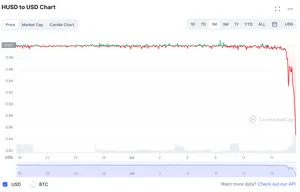Experienced crypto trader suffers $470,000 theft after signing malicious message
Crypto.com reportedly lays off hundreds more employees than they announced, tries to hide it
Marszalek also tried to discourage employees from leaking about the layoffs, saying at a company town hall: "A number [of employees laid off] makes for a great headline, it's a great thing to gossip about. [But] as co-owners of this company, you should ask yourself, 'is it in my interest for this number to be out there?'" One employee told The Verge that this did nothing to assuage their fears about the layoffs, and that "[it felt like] I got told to shut up and get back to work. It felt insulting."
One recent review on Glassdoor claims that Crypto.com had laid off "more than 1,000 employees", and alleged that "They've removed the company directory so we can't see the numbers go down."
South Korea moves to block sixteen unregistered crypto exchanges
Although the FSC informed the exchanges they needed to register and report their activities, the exchanges did not comply. The FSC has moved to block access to these exchanges in the country, including by asking communications authorities to block access to the exchanges' websites. The FSC pointed to the risk of user data leaks and money laundering as motivations for their action.
Those operating unregistered exchanges in the country could face up to five years imprisonment or a ₩50 million ($37,900) fine, and be barred from registering in the country for five years.
Binance exec claims that scammers are using deepfakes to impersonate him
The only evidence Hillman provided was a redacted conversation via LinkedIn, where he denies meeting with someone, and they reply: "they impersonated your hologram. This person sent me a zoom link then your hologram was in the zoom". (Again, hologram?) Amusingly, Hillman waxes poetic about the importance of security at Binance throughout the whole post, while also including a LinkedIn screenshot with a name that's blurred so poorly it remains completely legible.
Hillman goes on to claim, with no further evidence, that "a sophisticated hacking team used previous news interviews and TV appearances over the years to create a 'deep fake' of me". If so, this would be remarkable, as to date video deepfakes have mostly been limited to robotic-sounding and grainy pre-recorded Elon Musk impersonations, rather than anything that can respond naturally and quickly to alive conversation.
Another possible explanation is that Hillman is trying to cover Binance's collective ass after being caught taking listing fees for tokens they never list. But who's to say, really — maybe deepfakers have made a considerable breakthrough with startling implications, and Hillman just didn't feel it was important to elaborate on.
- "Scammers Created an AI Hologram of Me to Scam Unsuspecting Projects", Binance
- "Binance executive claims scammers made a deepfake of him", The Verge
- "News: $3b Bitcoin scam, BitConnect, Tezos ruling, bad ICO news, BitFi, Augur, Voatz", David Gerard
- "Update: Binance charged Blockstack $250,000 prior to listing Stacks, but both say it's not a listing fee", The Block
Adam Neumann continues to fail upwards as VCs throw even more money at the ex-WeWork CEO
But Neumann has so far enjoyed a comeback thanks to the likes of Andreessen Horowitz, who led a $70 million funding round in May for Neumann's "Flowcarbon" startup, which aims to sell tokenized carbon credits — sorry, "Goddess Nature Tokens" — to companies trying to green up their image.
Andreessen Horowitz is now enabling another one of Neumann's new crypto schemes to the tune of $350 million — its largest investment to date. This one is just called "Flow", in which Neumann is returning to the real estate industry in a company that aims to help with the residential housing crisis... with blockchain, somehow.
God forbid the venture capitalists give money to deserving founders who haven't already been given, and squandered, a chance. Responding to the news that a16z had put $350 million into Neumann's new gambit — an amount larger than the money raised by all Black-founded startups in the US combined in Q2 — author and investor Kathryn Finney said it was a "slap in the face". "It sends a signal that you can really mess up as a white guy and still get second chances to win," she said.
HUSD stablecoin depegs
Several weeks earlier, major crypto exchange FTX announced that they had removed HUSD from their USD basket, meaning they would not be able to be used as collateral.
Huobi worked to distance itself from HUSD as the coin de-pegged, emphasizing that the token is maintained by a different entity and claiming to have exited their stake in that entity in April. However, the token was originally launched by Huobi in 2018, and Huobi has continued to run promotions involving the token as recently as July.
Celer Network's cBridge suffers BGP hijacking attack, users lose combined $240,000
- Tweet by CelerNetwork
- Etherscan for attacker wallet
- "Truth Behind the Celer Network cBridge cross-chain bridge incident: BGP hijacking", SlowMist
Genesis lays off 20% of employees, jettisons CEO after Three Arrows Capital disaster
- "Genesis Announces New Leadership Team", press release
- "Genesis CEO Steps Down as Crypto Broker Slashes Its Workforce", Bloomberg
Canadian pension manager says they invested "too soon" in the crypto sector after $150 million loss
Needless to say, this hasn't worked out so hot for CDPQ — Celsius locked up its customers' funds in June and filed for bankruptcy in July, and the courts are in the middle of trying to figure out how to untangle it all. "For us it's clear when we look at all of this, even if the last chapter has not been written, that we went in too soon into a sector that was in transition", said CDPQ's CEO.
CDPQ reported a $33.6 billion loss in the first half of 2022, which they attribute mostly to declines in equity and bond markets.


![Screenshot of messages between a blurred individual and Patrick Hillman.
Individual: "Hi Patrick this is [blurred], I had a conversation with Mark J Marshall, can you confirm the Zoom call we had on Thursday with you?"
Patrick Hillman: "That wasn't me."
Individual: "they impersonated your hologram
[LinkedIn link]
This person sent me a zoom link then your hologram was in the zoom , please report the scam"](https://primary-cdn.web3isgoinggreat.com/entryImages/resized/binance-linkedin-scam_300.webp)





